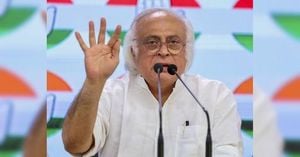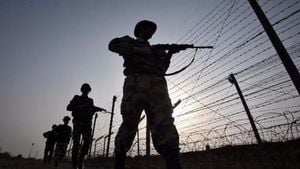In a significant development amidst rising tensions between India and Pakistan, Saudi Arabia’s Minister of State for Foreign Affairs, Adel Al-Jubeir, made an unannounced visit to New Delhi on Thursday, May 8, 2025. The visit comes just a day after India launched Operation Sindoor, a military initiative targeting nine locations in Pakistan and Pakistan-administered Kashmir, which India claims were used to plan and execute terrorist attacks against its territory.
External Affairs Minister S. Jaishankar met with Al-Jubeir shortly after his arrival, emphasizing India’s commitment to countering terrorism. In a post on social media platform X, Jaishankar stated, "A good meeting with @AdelAljubeir, Minister of State for Foreign Affairs of Saudi Arabia this morning. Shared India’s perspectives on firmly countering terrorism." This meeting underscores the diplomatic efforts being made to manage the escalating conflict in the region.
The backdrop to Al-Jubeir's visit is the recent military strikes conducted by India in retaliation for a terrorist attack in Pahalgam, Kashmir, on April 22, which resulted in the deaths of 26 individuals, including 25 Indians and one Nepali. The Indian military's operation, which occurred early on May 7, aimed at eliminating key terror infrastructures linked to the Jaish-e-Mohammad (JeM) and Lashkar-e-Taiba (LeT) organizations. Pakistani officials reported that the strikes resulted in at least 31 casualties.
Foreign Secretary Vikram Misri explained that the decision to conduct these strikes was made because there had been "no demonstrable step" from Pakistan to address the terrorist infrastructure operating from its territory. Misri stated, "India decided to carry out the 'proportionate' strikes to bring the perpetrators and planners of the April 22 Pahalgam terror attack to justice." The military action, dubbed Operation Sindoor, targeted nine sites, including Bahawalpur and Muridke, which are known strongholds for terrorist activities.
In addition to Al-Jubeir’s visit, Iranian Foreign Minister Seyed Abbas Araghchi also arrived in New Delhi late on May 7 for a scheduled meeting with Jaishankar. This visit highlights the complex web of international diplomacy at play as both nations seek to navigate the heightened tensions. Araghchi has previously suggested that Iran could mediate between India and Pakistan, a proposal that has drawn mixed reactions from New Delhi.
As the situation continues to develop, world leaders have urged both nations to exercise restraint and seek dialogue to de-escalate hostilities. Kashmir, a region claimed in full by both countries yet controlled in part, has been a longstanding point of contention since the partition of British India in 1947. This conflict has led to multiple wars and ongoing violence, particularly in Indian-administered Kashmir, where insurgent movements have emerged, often attributed to support from Pakistan.
In a related context, Pakistan’s Deputy Prime Minister and Foreign Minister Ishaq Dar acknowledged that there had been contact between Indian and Pakistani national security advisers, indicating potential back-channel communications aimed at reducing tensions. The Pakistani government has recently appointed Lt Gen Muhammad Asim Malik as the new National Security Adviser, a move seen as significant in the context of security policy and outreach to India.
During an all-party meeting in India, government officials, including Jaishankar, discussed the success of Operation Sindoor and its implications. Union ministers and opposition leaders convened to address the ongoing situation, emphasizing a united front against terrorism while also acknowledging the need for diplomatic solutions.
Jaishankar had previously engaged with foreign ministers from several countries, including Spain, France, Germany, Japan, and Qatar, to gather support for India's stance on cross-border terrorism. His discussions have focused on the importance of international solidarity in combating terrorism, especially in light of the recent attacks.
Operation Sindoor has not only escalated military tensions but also prompted India to consider a range of punitive measures against Pakistan, including the suspension of the Indus Waters Treaty, which governs the use of water resources shared by both nations. This action reflects India’s broader strategy to respond decisively to perceived threats emanating from across the border.
As the situation unfolds, the international community watches closely, understanding that the stakes are high not just for India and Pakistan but for regional stability as well. The dynamics of diplomacy, military action, and public sentiment will play critical roles in shaping the future of relations between these two nuclear-armed neighbors.
In conclusion, the visits by Al-Jubeir and Araghchi signal a growing recognition among key players in the region of the need for dialogue and de-escalation. However, the path forward remains fraught with challenges, as both nations grapple with the realities of their historical animosities and the urgent need for peace.





